
On Friday, the Joint Office of Energy and Transportation announced it had awarded $46.5 million for 30 projects to boost electric vehicle (EV) charging performance and grow the clean energy workforce.
The projects in 16 states and Washington, D.C. are part of the investment into a national network or more than 500,000 public EV charging ports, and part of the Biden Administration’s goal to reach net-zero emissions by 2050.
“The Biden-Harris Administration is focused on ensuring that America wins the EV race, capturing good-paying jobs and the benefits of a clean energy manufacturing economy,” U.S. Transportation Secretary Pete Buttigieg said. “These funds are part of that mission, helping to grow our new automotive economy with EVs and EV chargers that are made in America by American workers.”
The funding is part of the National Electric Vehicle Infrastructure (NEVI) Formula Program and the Charging and Fueling Infrastructure Discretionary Program administered by the Federal Highway Administration (FHA). Officials said the awards will invest in EV charging resiliency, community-driven models to install EV chargers in or near underserved communities, and EV performance and reliability initiatives.
“President Biden’s Investing in America Agenda is supporting the buildout of an affordable and reliable EV charging infrastructure built by America’s workers,” U.S. Secretary of Energy Jennifer M. Granholm said. “Today’s funding helps drive the nation forward toward an equitable clean transportation future – one that energizes local economies and builds more resilient communities.”
The funding is part of the Bipartisan Infrastructure Law and will help increase charger reliability by providing funding for validating and testing charging equipment, advancing new business models for electrified shared mobility and fleet-based services, and increasing opportunities for underserved communities through new jobs and training resources, officials said.
“These investments ensure we can meet unique local needs, create good-paying jobs for everyone, innovate new business models, test products thoroughly and work towards our goal of making it easy for everyone to ride and drive electric,” Gabe Klein, Executive Director of the Joint Office of Energy and Transportation, said.